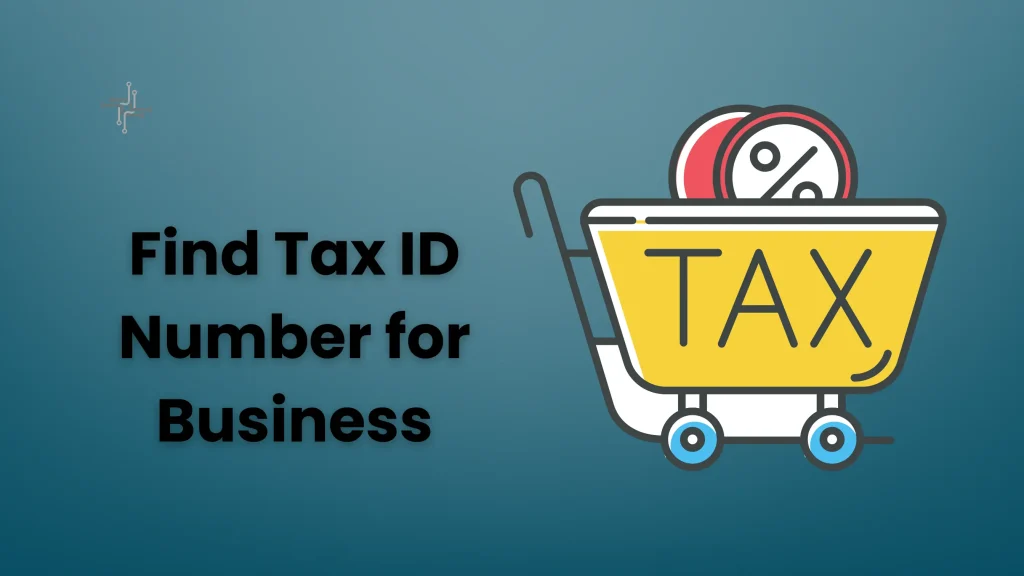A Tax ID number is an identification number used by the IRS to track your business for tax purposes. It is required for businesses to file taxes, open a business bank account, and apply for licenses. The most common types of Tax ID numbers are the Employer Identification Number (EIN) and the Social Security Number (SSN). Each serves different business needs, depending on the structure and size of the business.
Finding your business’s Tax ID number is important to avoid delays in tax filings and legal processes. Without it, you may face fines or complications when doing business with vendors, clients, or government agencies. It also helps ensure you meet your tax obligations and comply with the law.
Table of Contents
What is a Tax ID Number
A Tax ID number is a unique number issued by the IRS for tax purposes. It helps identify businesses or individuals in the tax system. The number is required for tax filings, opening business accounts, and other legal processes. It ensures that the IRS can track and manage your business or personal tax obligations accurately.
For businesses, the most common Tax ID number is the Employer Identification Number (EIN). This number is used for things like hiring employees, filing tax returns, and applying for business licenses. It’s essential for businesses of all sizes, from small startups to large corporations.
Individuals may use other types of Tax ID numbers, such as a Social Security Number (SSN) or an Individual Taxpayer Identification Number (ITIN). These numbers are typically used by individuals who are self-employed or need to report income to the IRS.
Having a Tax ID number ensures that businesses and individuals meet their tax obligations. It also helps prevent legal issues and delays in important business processes like tax filing and applying for loans.
Why Do You Need a Tax ID Number
A Tax ID number is crucial for both individuals and businesses to comply with tax laws. It is required by the IRS for accurate tracking of tax filings and payments. Without a Tax ID number, you cannot file taxes properly, which could lead to legal issues and penalties. It ensures that your tax obligations are clearly identified and processed correctly.
For businesses, a Tax ID number is essential for opening a business bank account, applying for licenses, and hiring employees. It also allows businesses to file taxes, pay employees, and report earnings to the IRS. Whether you’re a small business owner or managing a larger company, having a Tax ID is necessary for daily operations.
Individuals also need a Tax ID number for reporting income, especially if they are self-employed. It’s required for tax filings and certain financial activities, such as applying for loans. Without it, individuals may face delays or complications in their financial dealings.
Tax ID number is necessary to meet tax obligations, stay compliant with the law, and carry out business and financial activities. It helps prevent mistakes and ensures that everything runs smoothly.
Different Types of Tax ID Numbers
1. Employer Identification Number
The Employer Identification Number (EIN) is a unique number assigned to a business by the IRS for tax reporting purposes. It is required for businesses to file tax returns, hire employees, open business bank accounts, and apply for business licenses. Whether you’re running a corporation, partnership, or LLC, an EIN is essential for handling taxes and other legal business matters. It also helps businesses avoid using the owner’s personal Social Security Number (SSN).
2. Social Security Number
A Social Security Number (SSN) is assigned to individuals by the Social Security Administration (SSA) for personal tax purposes. It is used to file personal income taxes, track earnings, and determine eligibility for Social Security benefits. For self-employed individuals or sole proprietors, the SSN often serves as their Tax ID number. It is essential for identifying individuals within the IRS system and for reporting income accurately.
3. Individual Taxpayer Identification Number
The Individual Taxpayer Identification Number (ITIN) is issued by the IRS to individuals who are not eligible for a Social Security Number (SSN). It is mainly used by non-resident aliens, their spouses, and dependents who need to file taxes but do not qualify for an SSN. The ITIN allows individuals to comply with U.S. tax laws even without an SSN, ensuring that they can report income and avoid penalties for failing to file tax returns.
Find Your Business’s Tax ID Number
Finding your business’s Tax ID number is essential for completing tax forms, filing returns, and other legal activities.
Check Official Documents
The first place to look for your business’s Tax ID number is in your official documents. If you’ve applied for an Employer Identification Number (EIN), it should be listed on the IRS confirmation letter you received after your application. You can also find it on your business tax returns, payroll documents, or any other IRS-related correspondence. These documents serve as proof of your business’s Tax ID number.
Contact the IRS
If you can’t find your business’s Tax ID number on your documents, you can contact the IRS directly for assistance. The IRS can provide the number after verifying your identity and your business details. You can reach the IRS Business & Specialty Tax Line at 1-800-829-4933. Be prepared to answer some security questions to confirm your identity before they release the information.
Use Your Online IRS Account
If you have an online IRS account, you may be able to access your business’s Tax ID number directly from there. The IRS allows business owners to manage their account online and view important tax information, including the EIN. If you don’t already have an online account, you can create one by visiting the IRS website. This can be a quick and convenient way to retrieve your Tax ID number.
Steps to Apply for a Tax ID Number
1. Determine the Type of Tax ID Number You Need
Before applying, decide which type of Tax ID number is right for you or your business. If you’re starting a business, you’ll likely need an Employer Identification Number (EIN). If you’re an individual who needs a Tax ID number for tax reporting, you may need a Social Security Number (SSN) or an Individual Taxpayer Identification Number (ITIN). The requirements depend on your specific situation.
2. Apply Online for an EIN
The quickest way to apply for an Employer Identification Number (EIN) is online through the IRS website. The online application is free and available for businesses located in the United States or its territories. To apply, visit the IRS EIN application page, fill out the required information, and submit the form. After completing the application, you will receive your EIN immediately, which you can use for business-related tax matters.
3. Apply by Mail or Fax
If you prefer, you can apply for an EIN by mail or fax. To do this, you need to fill out Form SS-4, which is available on the IRS website. Once completed, mail or fax the form to the appropriate IRS office. The processing time for applications by mail or fax is generally around 4 weeks. Be sure to double-check all the information for accuracy to avoid delays.
4. Apply for an ITIN or SSN
If you’re an individual needing a Tax ID number, you can apply for an Individual Taxpayer Identification Number (ITIN) or a Social Security Number (SSN). To apply for an SSN, you must visit the Social Security Administration’s website and submit an application. If you’re not eligible for an SSN but need a Tax ID for tax purposes, apply for an ITIN using IRS Form W-7. The process for obtaining an ITIN typically takes 7-11 weeks.
Common Mistakes to Avoid
- Providing Incorrect Information: One of the most common mistakes when applying for a Tax ID number is providing incorrect or incomplete information. This can include errors in your business name, address, or legal structure. If any details are wrong, it can delay your application process or result in the wrong Tax ID being assigned. Always double-check the accuracy of the information before submitting your application.
- Applying for the Wrong Type of Tax ID: Another mistake is applying for the wrong type of Tax ID number. Businesses need an Employer Identification Number (EIN), while individuals may need a Social Security Number (SSN) or an Individual Taxpayer Identification Number (ITIN). Make sure you understand which Tax ID number you need based on your specific situation. Applying for the wrong one can cause confusion and delays.
- Not Keeping Track of Your Tax ID Number: Once you have your Tax ID number, it’s important to keep it in a safe and easily accessible place. A common mistake is misplacing the number or forgetting where it’s stored. Losing your Tax ID number can create difficulties when filing taxes, applying for business loans, or handling other business matters. Keep a digital or physical copy of the number for future reference.
- Missing Deadlines: Tax ID numbers are often needed by specific deadlines, such as when filing taxes or registering your business. Missing these deadlines can result in penalties or missed opportunities. Be sure to apply for your Tax ID number early to avoid any last-minute issues or delays that could affect your business operations.
- Not Understanding the Eligibility Requirements: A common mistake is not understanding the eligibility requirements for obtaining a Tax ID number. For example, businesses must ensure they meet certain criteria to apply for an Employer Identification Number (EIN), and individuals must provide proper documentation to qualify for a Social Security Number (SSN) or an Individual Taxpayer Identification Number (ITIN).
Conclusion
Finding your business’s Tax ID number is important for tax filing, banking, and legal work. You can check your business documents, contact the IRS, or use your online IRS account to find it. Make sure to keep it safe for future use.
If you need a new Tax ID, apply early to avoid delays. Follow the correct steps and give the right details. Avoid common mistakes like applying for the wrong type or missing deadlines. A Tax ID number helps your business stay legal and organized. Keep it safe and use it when needed.



1ffrrd
jiqrn4
bwn2ch